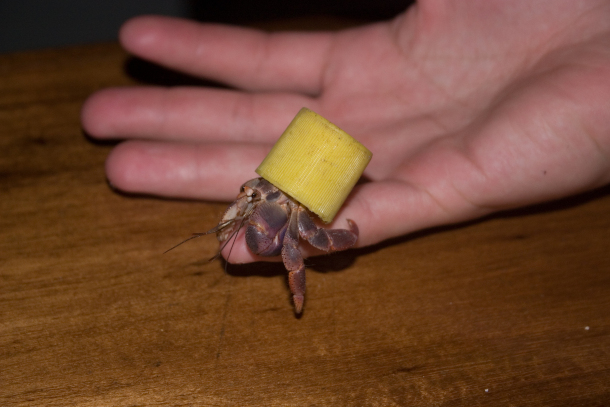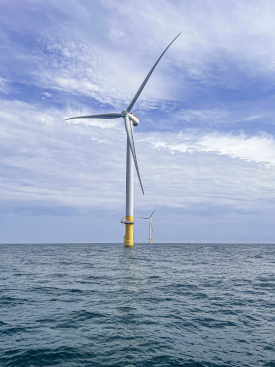Beyond the Headlines
Air Date: Week of February 2, 2024

Researchers reviewing online imagery found 386 examples of hermit crabs using artificial shells such as plastic caps. (Photo: Eric Heupel, Flickr, CC BY-NC 2.0)
This week, Living on Earth Contributor Peter Dykstra joins Host Jenni Doering with news of a study that found hermit crabs are using plastic trash as their homes instead of seashells. Also, New Jersey approves two major offshore wind projects that could power 1.8 million homes. And in history, they remember when Jacques Cousteau published The Silent World and revealed the mysteries of the oceans.
Transcript
O’NEILL: It’s Living on Earth, I’m Aynsley O’Neill.
DOERING: And I’m Jenni Doering.
Down in Georgia, Living on Earth Contributor Peter Dykstra has some stories from beyond the headlines he’d like to share. Hey, Peter, what’s on tap this week?
DYKSTRA: Hi Jenni, we've got a lot of stuff from the water. Number one is based on a study from a team of scientists in Poland, publishing in the Science of The Total Environment Journal, and they have found hermit crabs, those adorable little crustaceans you see running up and down the beach whose shells are borrowed, usually, from other species. But in this study, they found 386 examples of hermit crabs who found garbage as a more acceptable home than another animal's shell. Those more innovative hermit crabs, if that's in fact what they are, were using plastic bottle caps, sometimes small pieces of metal or glass. And while this doesn't constitute any kind of a majority of hermit crabs, hermit crabs could be the latest manifestation of how plastics and other manmade materials are beginning to take over corners of marine life we would have never imagined they'd take over.
DOERING: Well, it certainly does speak to the volume of plastic trash that we're putting out into the environment. You know, Peter, I don't know if you're on TikTok these days. But one of my favorite TikTokers is actually taking some of these hermit crabs, like going out and finding the ones that have these plastic bottles as their home, and offering them a natural home, a shell, and they always move in and seem to enjoy it.
DYKSTRA: I'll have to check it out.
DOERING: Well, Peter, what else do you have for us beyond the headlines this week?

New Jersey recently awarded contracts for two large offshore wind projects. (Photo: Jess Stromberg, Bureau of Ocean Energy Management, Flickr, CC BY-SA 2.0)
DYKSTRA: My home state of New Jersey, often known as the Garden State, occasionally depicted as the mafia state, lost two big offshore wind projects last year. But after losing those two projects last year, that could have powered a million homes, they're in the midst of signing up two new projects for not just a million but 1.8 million homes worth of electricity from offshore windmills.
DOERING: That is quite a lot of wind power, Peter.
DYKSTRA: It is. And it's a sign that even though there was a little bit of a glitch in the growth of wind power, the confidence is there to make these things work and battle against climate change from the overuse of fossil fuels.
DOERING: Sounds like wind in the sails of offshore wind.
DYKSTRA: That's what it is exactly.
DOERING: So Peter, for history this week, are we sticking with this ocean theme?

Oceanographer Jacques-Yves Cousteau was known in part for his book The Silent World, published on February 3, 1953, and for his 1956 documentary of the same name. (Photo: Hans Peters / Anefo, Wikimedia Commons, Public Domain)
DYKSTRA: Yes, we're sticking with this ocean theme. On February 3, 1953, one of the greatest ocean explorers ever, Captain Jacques Cousteau, published his smash hit book, The Silent World. Just absolutely riveting, breathtaking, never-before-seen images of what lies below the ocean surface. Cousteau followed up this book that sold 5 million copies. Later, he did The Silent World as a documentary that eventually won an Academy Award, and he became the master explorer, bringing those images from beneath the oceans to people's living rooms. Cousteau was always a hero of mine, with his documentaries on ABC, and later on TBS. Cousteau kept producing this kind of work right until his death in 1997, and his children and grandchildren continue the work today.
DOERING: I've heard so many people talk about just how influential Jacques Cousteau's work, and bringing the undersea world to the rest of the world, was in shaping our understanding of the oceans.
DYKSTRA: Really, anything you see that's in documentary form, about the oceans or about the sea floor was preceded and certainly inspired by the work of Captain Cousteau.
DOERING: And the ocean is a place we're still discovering. I mean, it's been said that we've mapped more of the moon than we have the ocean floor.
DYKSTRA: And hopefully we'll continue to discover it and protect it before we're discovering the downside, like hermit crabs wearing bottle caps.
DOERING: Well, thank you, Peter. Peter Dykstra is our Living on Earth contributor, and we'll talk to you again next week.
DYKSTRA: Okay, Jenni, thanks a lot. Talk to you soon.
DOERING: And there's more on these stories on the Living on Earth website. That's LOE.org.
Links
Washington Post | “Majority of Land Hermit Crab Species Now Use Trash for Shells”
Access the original study in Science of The Total Environment
E&E News | “NJ Hits Reset on Offshore Wind, Approves Two Massive Projects”
Living on Earth wants to hear from you!
Living on Earth
62 Calef Highway, Suite 212
Lee, NH 03861
Telephone: 617-287-4121
E-mail: comments@loe.org
Newsletter [Click here]
Donate to Living on Earth!
Living on Earth is an independent media program and relies entirely on contributions from listeners and institutions supporting public service. Please donate now to preserve an independent environmental voice.
NewsletterLiving on Earth offers a weekly delivery of the show's rundown to your mailbox. Sign up for our newsletter today!
 Sailors For The Sea: Be the change you want to sea.
Sailors For The Sea: Be the change you want to sea.
 The Grantham Foundation for the Protection of the Environment: Committed to protecting and improving the health of the global environment.
The Grantham Foundation for the Protection of the Environment: Committed to protecting and improving the health of the global environment.
 Contribute to Living on Earth and receive, as our gift to you, an archival print of one of Mark Seth Lender's extraordinary wildlife photographs. Follow the link to see Mark's current collection of photographs.
Contribute to Living on Earth and receive, as our gift to you, an archival print of one of Mark Seth Lender's extraordinary wildlife photographs. Follow the link to see Mark's current collection of photographs.
 Buy a signed copy of Mark Seth Lender's book Smeagull the Seagull & support Living on Earth
Buy a signed copy of Mark Seth Lender's book Smeagull the Seagull & support Living on Earth

